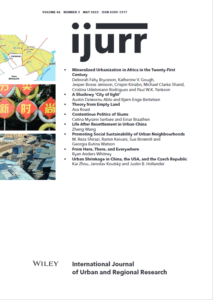The rapid expansion of African cities has created both housing deficits and a pluralization of urban orders, including the growth of slum settlements. With an ever-increasing middle class, urban sub-Saharan Africa is now also characterized by large-scale land acquisition processes linked to the construction of wholly private and increasingly enclaved cities. This article maps the impacts of the Appolonia City of Light project—a privately built enclaved city catering to the housing needs of a rapidly growing middle class in Ghana. Building on field research and exploring various dimensions of the development marketed as ‘The City of Light’, we highlight how the project has dramatically altered social relations and resulted in dispossession rippling through nearby local communities. We therefore argue that, instead of merely focusing on the actual physical spaces of private developments or turning attention to often phantasmagoric and utopic visions of the future, research should be directed at changes in the immediate surroundings of urban developments. We highlight the problematic land acquisition inherent to such enclaved developments and demonstrate how these intrinsically constitute assemblages of livelihoods and exemplify dynamics of appropriation, dispossession and commodification.
Details
Written by:
Austin Dziwornu Ablo & Bjørn Enge Bertelsen
Digital Object Identifier (DOI)
10.1111/1468-2427.13085
About DOI

